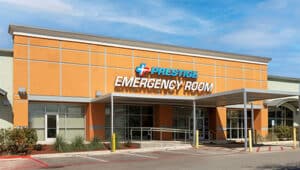Emergency Room for Diarrhea Treatment
Chronic or severe diarrhea can be a sign of a serious underlying medical condition and can also increase the risk of dehydration. Persistent diarrhea may require medical attention in an ER setting to prevent complications. Prestige Emergency Room offers effective emergency diarrhea treatment 24/7 at our four San Antonio locations.
When to Go to the ER for Diarrhea
It is important to understand when diarrhea is an emergency that requires immediate medical attention. Adults should seek emergency care if:
- Your diarrhea lasts for more than two days without improvement.
- You have severe pain in your rectum or abdomen.
- You notice bloody, black, or sticky stools.
- You run a fever over 102°F.
Dehydration calls for a trip to the ER. Symptoms of dehydration may include:
- Extreme thirst.
- Minimal urination.
- Dark urine.
- Sunken eyes.
- Rapid heart rate.
- Extreme weakness.
- Confusion.
- Seizures.
Other symptoms of diarrhea may include:
- Nausea.
- Vomiting.
- Stomach cramps.
- Bloating.
- Fever.
- Blood or mucus in the stool.
What’s Causing My Diarrhea?
Diarrhea can have a variety of causes, from mild to serious. Some of the most common include:
- Food poisoning. Often the result of eating food contaminated with bacteria or other pathogens, food poisoning can cause vomiting or diarrhea for a day or so.
- Gastrointestinal infection (stomach “bug”): Various contagious viruses can cause diarrhea, including norovirus, viral hepatitis, and enteric adenovirus. A COVID-19 infection can sometimes cause diarrhea.
- Food allergies and sensitivities: For some people, certain foods may trigger a reaction, including diarrhea. For example, those with lactose intolerance may experience diarrhea after eating dairy products.
- Acute or chronic stress: Stress can often have an impact on your body, including your digestive system.
- Medications: Certain medications can cause diarrhea, including antibiotics and anti-cancer drugs.
- Irritable bowel syndrome (IBS): This condition can be associated with either constipation or diarrhea.
- Other digestive disorders: Chronic diarrhea can also be due to other digestive conditions, including Crohn’s disease, ulcerative colitis, celiac disease, and inflammatory bowel disease (IBD).
How Can I Tell What’s Causing My Diarrhea?
Your gastrointestinal (GI) system depends on a balance of “good” microorganisms to function properly, and when this balance becomes disturbed, diarrhea is often the result. This imbalance, or issues like traveler’s diarrhea, can cause several symptoms, including loose, watery, or discolored stool.
Many things can affect the balance of your GI system, including food sensitivities, stress, and illness. This makes determining the cause of acute or chronic diarrhea difficult. Seeing a doctor for diarrhea that lasts more than a few days (or a single day in young patients or older adults) is very important to prevent dehydration. When you visit the ER for diarrhea treatment, a physician can assess your condition and order testing to determine if an underlying issue like IBS or IBD is involved.
When to Worry About Diarrhea
Many of us have occasional bouts of diarrhea, sometimes after eating certain foods or as a result of stress. These cases of diarrhea usually clear up on their own, and drinking plenty of fluids can help avoid dehydration.
Persistent or recurrent diarrhea, however, can indicate a serious disorder or infection, and it can also cause dehydration and an imbalance of electrolytes, resulting in more serious symptoms. At Prestige ER, our knowledgeable staff can provide treatment for severe diarrhea.
Emergency Diarrhea Treatment
When you visit Prestige ER for diarrhea treatment, you can be assured that our experienced team will provide rapid care in a comfortable environment. Before treatment, you can expect to have an exam, including a review of your symptoms and a discussion of your family medical history to look for potential risk factors for certain digestive conditions.
Your doctor will listen to your abdomen with a stethoscope and gently press on this area to look for areas of swelling or pain. You may have diagnostic tests like a CT scan or ultrasound to help your provider identify the source of your symptoms.
Once your doctor diagnoses the cause, they will discuss your treatment options and begin treatment. This may include:
- Antibiotics or antiparasitic medication for diarrhea due to a bacteria or parasite.
- Medication to control painful spasms and cramps.
- Dietary or lifestyle changes.
- Additional tests or bloodwork to identify underlying conditions, if indicated.
If you are dehydrated, your provider may order IV fluid therapy. IV fluid is administered directly into your vein and can correct dehydration and restore the balance of essential electrolytes. Our experienced staff can administer IV therapy onsite. We will work to ensure you feel comfortable as we help you on your way to recovery.
For rapid, excellent treatment for severe diarrhea and other medical emergencies, visit Prestige ER. We offer convenient care at our four San Antonio locations.












